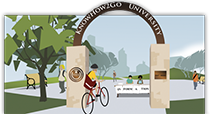The knowhow2go website is not currently being maintained. Some functionality may be unavailable while we consider future changes.
Four Steps to College
1
Step 1 - Be a Pain
Let everyone know that you're going to college and need their help.
- Never say no. Don't ever take that "no" in your head for an answer!
- Find family support. So what if your parents didn't go to college? Your folks may well have real experience and knowledge that can help you on your way.
- Call on coaches. Ask your teachers and coaches for advice on college - it's their job to help you succeed.
- Gain experience. Track down places outside of school where you can get real-world experience from adults who can show you how it's done.
- Seek advice. If you can't talk with your school counselor, check your local community college or community center and meet with the counselors there.
- Make connections. Connect with family, friends or neighbors who have been to college and ask them how they got there.
2
Step 2 - Push Yourself
Working a little harder today will make getting into college even easier.
- Take the right classes. To get into college, start by taking the right classes in high school. Find out what classes you need to meet entrance requirements and sign up for them now. Lock in requirements. You may not need them to finish high school, but most colleges require three to four years of math, English, science and social studies. Plus, most want at least two years of the same foreign language.
- Meet the challenge. Sure, grades are important, but the tougher the courses you take, the more likely it is that a college will decide to take you. In general, most colleges prefer students who challenge themselves with harder courses, even if they earn only average grades, than those who take easier courses just to get higher grades.
- Achieve honors. Honors and Advanced Placement courses are the gold standard for colleges and carry much more weight than other courses in working out your grade point average.
- Tap into computing. Courses in computer science (or even classes that require you to use computers in researching or completing projects) will give you the skills you need to make the grade at college.
3
Step 3 - Find the Right Fit
Find out what kind of school is the best match for you and your career goals.
- What's the right match? The kind of college you choose to attend should reflect your goals and your personality. Whether you choose a public, private, community, technical, trade or even online college, make sure it's the best match for you.
- Big or small? Do you want to attend a big university with more choices of studies and social activities, but also larger lecture classes? Or would you like fewer choices but more personal attention and a better chance to stand out? You decide.
- Home or away? Attending a local college versus boarding out of state - what's better? It depends. For some, residence hall life is an important part of the college experience, but commuting from home is less expensive.
- Which major works? Figuring out what you like doing most, plus what you're best at, can point to the careers you should consider - and what majors will help you reach your career goal.
- Why extras matter. Getting into extracurricular activities outside of class - band, science club, the school newspaper, drama or even volunteering - helps you discover what your real interests are and where you're heading.
4
Step 4 - Put Your Hands on Some Cash
If you think you can't afford college, think again. There's lots of aid out there.
- Who gets it? Many more people than you might think. Financial aid is awarded based on need or merit - academic achievement, athletics and other talents. But you have to apply for aid to find out.
- What kind of money? Grants, scholarships, work-study, student loans - there are a lot of different types of financial aid out there. You need find out which kind or combination works best for your needs.
- Where do you look? Colleges expect you and your parents to pay what you can, but schools, state and federal government, and private businesses and organizations are also great sources for financial aid.
- Is it free money? Not likely - most financial aid packages are a mixture of grants that don't need to be paid back and loans that do, but not until after you graduate from college.
- How to apply. Your school guidance counselor can help you, including how to file a Free Application for Federal Student Aid (FAFSA), which makes you a candidate for all federal student aid. Remember, you never have to pay a fee for filling out a FAFSA; it's FREE! For help online, visit College Goal Sunday.
- Do deadlines matter? Absolutely. College financial aid goes fast. The earlier you can get in your FAFSA application and all of the other information that a college asks for, the sooner you'll receive your financial aid package.





